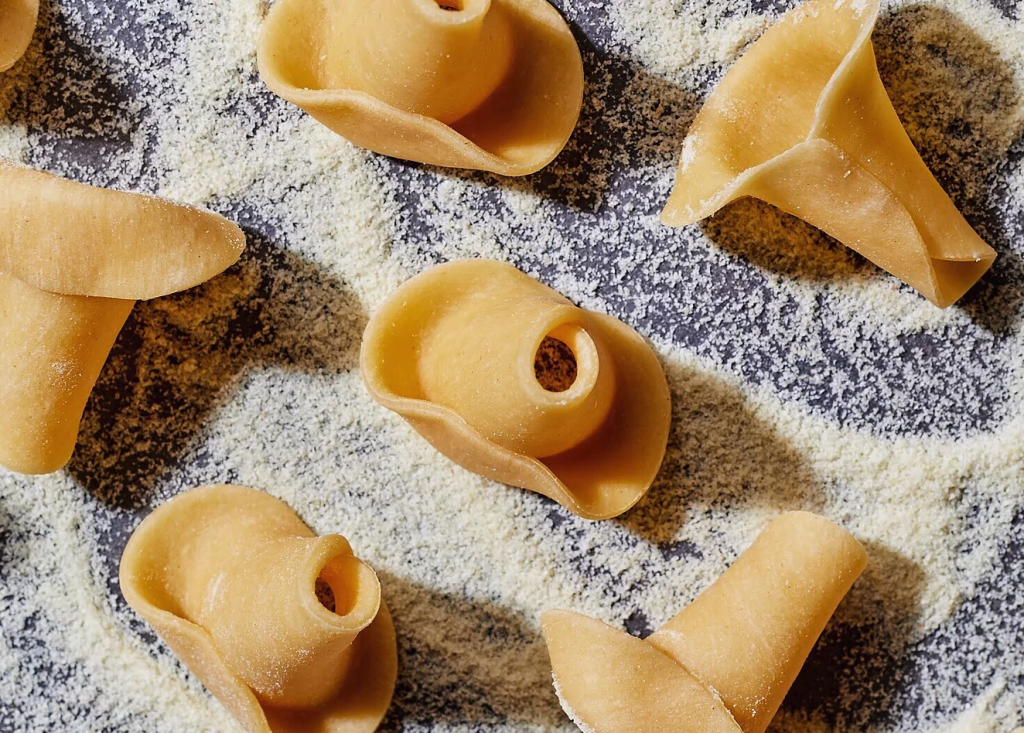CHATS / Meryl Feinstein of Pasta Social Club
December 20, 2019


Meryl took a leap from her PR career to work with James Beard Award-Winning chef, Missy Robbins, at Lilia and Misi, before launching her own stand-alone dining project, Pasta Social Club. We chatted with the PSC chef and founder to learn about her journey to bringing people together through the shared experience of pasta.
In your words, what is Pasta Social Club?
The goal behind Pasta Social Club is simple: connect with others over food. When I lived in New York, I found it incredibly difficult to meet new people, mostly because everyone was so busy and didn’t have time (or reason) to break out of their social comfort zones. Most of my time was spent with people I’d known for years, but who I didn’t have much in common with anymore; from high school, college, past jobs. I wanted to find a way to meet people and make real, not just cursory (or sketchy!), offline connections as a young adult in a big city. As a cook, I quickly gravitated toward pasta as a craft, so it was only natural that it became the medium for solving that personal problem I was facing.
What is the best part of the Pasta Social Club experience?
Every event is more about the people at the table than it is about the food. Of course, the food has to be great to get people in the door, but once you’re there, it’s all about the conversation. I think a very grim picture of our social reality has been painted in the last decade, but not once has a gathering been awkward or filled with people typing away on their phones— it’s been the complete opposite, and so exhilarating to be reminded that we are social creatures who are absolutely capable of interacting and building connections with people we’ve never met before. (Not to mention there are six courses of pasta to break the ice!)

How do you see Pasta Social Club evolving, long-term?
Thinking in year-long timeframes is a big ask these days— so much has changed in the last month alone! I will say I’ve seen a huge interest in classes and workshops. People really want to dig in and get their hands dirty, and I think it’s incredibly rewarding to come away from an experience having learned a new skill that can then be shared with others. So I’d say more educational tools. I’m hoping to get into video tutorials so I can reach more people, and that seems to be where digital engagement is heading.
How did you get started in the culinary world?
I started my career in the art world, working in communications for art museums and cultural institutions all over the world. I’ve always been interested in history and craftsmanship, and when I decided to transition into the food industry last year, I immediately connected with pasta-making as a very tactile art with a rich tradition. To an outsider, my career change may have seemed pretty abrupt, but I’d been obsessed with cooking television programs, tasting different cuisines, and experimenting in the kitchen from a young age. It eventually became clear— after five years and three jobs— that I didn’t see a future in what I was doing, so with the encouragement of my husband, I decided to enroll in culinary school to jumpstart my life in a new direction. After graduating, I worked briefly at the Brooklyn establishments Lilia and Misi before diving fully into Pasta Social Club.
Is there a chef who inspires you the most?
There are many, many chefs who inspire me. But the platform that has really made an impression on what Pasta Social Club is all about is the Pasta Grannies community (check them out on YouTube and Instagram). The videos are so cheerful and the dishes are always simple (though not necessarily easy). It keeps me grounded when I get caught up in what I “should” be doing to get more likes or followers or whatever else that’s unimportant. Plus, I study their videos to the letter trying to practice new shapes and techniques. Nothing beats learning from the pasta legends themselves!

Why is it so important to you to connect with others through food?
I didn’t grow up in a family of chefs or particularly great cooks, but I did grow up in a very tight-knit Jewish community that always came together over food. Sabbath dinner on Friday evenings was the highlight of my week. Much like the environment I’m trying to foster with PSC, it was centered on disconnecting from technology and the week’s stresses, and focusing on the people around you. We would all help in the kitchen and trade recipes, many of which I hope to pass on to my kids one day. Food has always been a vehicle for getting me to be present, and the best part is, I know that’s by no means unique to being Jewish, but rather one of the few universal bonds.
How would you describe your cooking style?
Relaxed? Spontaneous? Method-driven? I love cookbooks and recipes, but mainly as inspiration. Ask me to follow something with measurements and I’m checked out. I prefer to learn how to do something and then apply that to different ingredients and flavor combinations. I also gravitate toward Italian cooking because it doesn’t mess around too much. You’ll never find me adding powders or gels to any of my dishes!

Switching gears a bit, what is your favorite restaurant in New York City?
My husband proposed to me at Buvette in the West Village, so that will always be special to me (plus their sister restaurant, Via Carota, is wonderful). The best meal I’ve ever eaten was Blue Hill at Stone Barns. Does that count?
If you could cook for any chef in the world, who would it be and why?
Can I get back to you on this one? I’d never want to cook for a chef, but with a chef. Pasta-making is best when collaborative!
What job would you have if you weren’t a chef?
I’ve always dreamt of being a food writer or a novelist. Though it’s not too late for either of those!

Outside of food, what are your other passions?
I exercise a fair amount to offset the fact that I can never cook without butter again.
What culinary tool would you be lost without?
A fish spatula and longform tweezers.
Any tips for someone who is starting their journey in the culinary world?
It’s never too late to start something new, and keep pushing out of your comfort zone. The most rewarding experiences I’ve had in the last year were when I ignored what I thought I was supposed to do (or not do) and took risks. Get used to your heart beating fast and you’ll be asking “what if” a lot less frequently. What’s the worst that can happen?


